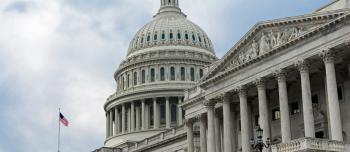Federal:
119th Congress Begins & President Trump Takes Office
The 119th Congress convened on January 3, 2025, with Republican control of both chambers. And with the inauguration of President Trump on January 20th Republicans have a trifecta. While President Trump’s agenda will undoubtedly start with lots of support, the margins are so slim in both the House and the Senate that there will be little to almost no room for disagreement among the Republican party.
President Trump wasted no time getting to work on his agenda. In his first ten days in office, he rescinded 78 executive actions signed by President Biden, including several related to public health, in addition to issuing dozens of his own Executive Orders (EO). Federal agencies have been working to comply with the changes but the full effect of these EOs is still unclear.
The Senate has been focused on confirming President Trump’s appointees to federal agencies. Just this week the Senate Finance Committee approved Robert F. Kennedy Jr. as nominee for the Department of Health and Human Services. The full Senate will still need to vote.
A New Congress
Every two years, we welcome a new Congress and with that comes an opportunity to educate new members of the House and Senate on NBDF and the bleeding disorders community. The 119th Congress welcomes 12 new Senators and 63 new members of the House of Representatives and has the most racial and ethnic diversity in history. The bleeding disorders community will be on Capitol Hill meeting with many members of the new Congress for NBDF’s annual Washington Days event in March.
Funding Freeze Scare
Last week, the White House Office of Management and Budget (OMB) issued a memorandum ordering all federal agencies to temporarily freeze payment of grants, loans, and to pause other relevant agency activities that are implicated by President Trump’s Executive Orders. The OMB memorandum sparked massive confusion and questions. Two federal courts have entered temporary orders against the Administration, requiring federal agencies to continue making payments while litigation continues over the legality of the OMB memorandum. And while OMB rescinded the memo, the White House continued to emphasize that all federal programs must still comply with President Trump’s EOs.
Consumer Financial Protection Bureau Issues Final Rule on Medical Debt
The Consumer Financial Protection Bureau published its final rule limiting the use of medical debt in credit reporting on January 7, 2025; however, it is not clear whether the rule will be implemented, since the rule will be subject to review and perhaps rescission due to the change in Administrations.
State:
Arizona: HB 2380, a bill creating a Rare Disease Advisory Council, was passed unanimously by the House Health and Human Services Committee Feb. 3.
Hawaii: Three bills have been introduced in the legislature to create a Rare Disease Advisory Council in the Department of Health. HB 910 was introduced by Reps. Matsumoto and Chun and has been referred to three different committees. HB 1288 is sponsored by Reps. Takayama and Amato and has been jointly referred to the House Finance Committee and the House Health Committee. SB 1497 is sponsored by Sen. Hashimoto and has been referred to the Senate Health and Human Services Committee and the Senate Ways and Means Committee.
Indiana: NBDF and advocates in Indiana are thankful to Senator Andrea Hunley for introducing SB 435 and Representatives Ben Smaltz and Julie McGuire for introducing HB 1252, the State’s copay accumulator ban legislation.
Iowa: The Senate Committee on Health and Human Services and the House Committee on Commerce each introduced legislation regulating pharmacy benefit managers, SSB 1074 and HB 99, on Jan. 30th. Both bills include language banning copay accumulator adjusters. The House Committee will hold a hearing on HSB 99 Wednesday, Feb. 5. NBDF staff will be testifying at the hearing. The same day, Bleeding Disorders of the Heartland will be holding its Advocacy Day. The two PBM reform bills are the chapter’s top legislative priority.
Maryland: NBDF signed onto patient advocacy group comments expressing concern over SB 357/HB 424, the State’s legislation to grant their state Prescription Drug Affordability Board (PDAB) the authority to establish upper payment limits.
Michigan: The Michigan Rare Disease Advisory Council (RDAC) bill has been passed by the legislature and approved by the Governor. Sue Lerch, Executive Director of the Hemophilia Foundation of Michigan, serves as a patient representative on the Board.
Missouri: The Senate Committee on Families, Seniors, and Health held a hearing on Rep. Fitzwater’s copay accumulator adjuster bill, SB 45, on Jan. 22nd. Rep. Hruza’s bill banning copay accumulator adjusters, HB 79, was introduced and referred to the House Insurance Committee. SB 187, another CAAP bill was introduced by Sen. Bernskoetter, and referred to the Senate Insurance and Banking Committee.
Nebraska: Sen. Wordekemper introduced LB 158, a copay accumulator adjuster bill, on Jan. 13th. The Senate Banking, Commerce, and Insurance Committee will hold a hearing on the bill March 3rd.
New Hampshire: On January 15th, Susie von Oettingen, an advocate in New Hampshire from the New England Hemophilia Association (NEHA), testified in Concord in support of SB 17, the State’s copay accumulator legislation, in the Senate Committee on Health and Human Services.
New Jersey: Stephanie Lapidow, the Executive Director of the Hemophilia Association of New Jersey (HANJ) testified on January 29th in favor of A5217, the State’s copay accumulator ban legislation in the Assembly Financial Institutions and Insurance Committee. The Bill was sent out of committee favorably.
North Dakota: The House Insurance, Business, and Labor held a hearing on HB 1216, Rep. Karls’ copay accumulator bill, Jan. 27th. NBDF, the Bleeding Disorders Alliance of North Dakota, and the Psoriasis Foundation testified at the hearing. Also, that day, BDAND held its Advocacy Day in the Capitol and met with numerous legislators regarding HB 1216 during a morning open house.
The previous week, NBDF staff and Rep. Karen Karls were interviewed by a local political podcast regarding HB 1216 and copay accumulator adjuster policies.
On January 29th BDAND and NBDF gave presentations and answered questions about bleeding disorders and patient advocacy at a companywide Rare Disease Awareness Month kickoff event by pharmaceutical manufacturer Aldevron in Fargo. The event was broadcast to Aldevron facilities through the U.S. and the U.K.
Ohio: NBDF submitted comments expressing concern and opposition over the State’s Medicaid 1115 waiver, which would implement additional work requirements for individuals under the age of 55.
Oklahoma: Rep. McCane introduced HB 1019, a bill to establish a Rare Disease Advisory Council in the state Department of Health, Feb. 3rd.
Oregon: Rep. Levy introduced HB 3086 and 3092, which would extend the state’s ban on copay accumulator adjuster policies to state employees and Oregon teachers, Jan. 13th. Both bills were referred to the House Behavioral Health and Health Care Committee. Levy also introduced HB 3082, which would require drug manufacturers to report to the state the number of consumers receiving copay assistance.
South Carolina: On January 15th, the Bleeding Disorders Association of South Carolina (BDASC) held their annual Legislative Breakfast event in Columbia. BDASC hosted over 250 individuals, including members from the House and Senate for breakfast and to discuss H. 3618, South Carolina's copay accumulator ban legislation and the importance of patient access.
Utah: Rep. Pierucci introduced an accumulator adjuster bill, HB 52, Jan. 21.
Virginia: On January 27th, the Virginia Hemophilia Foundation (VHF) and the Hemophilia Association of the Capital Area (HACA) held their Richmond Days advocacy event. Chapter members spent the morning talking to legislators about Virginia's proposed Prescription Drug Affordability Board to ensure patient groups are represented in discussions about rare disease therapy access, as well as the possible effects of the Medicaid trigger law on patients.





